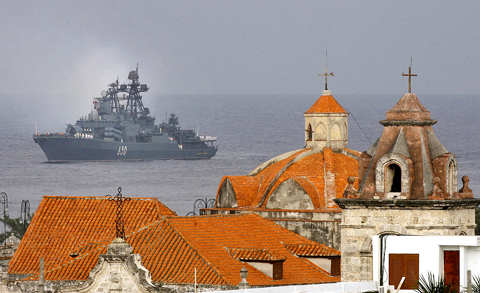A Russian anti-submarine destroyer and two logistical warships docked in Cuba on Friday, a thumb-your-nose port call aimed at Washington in waters just 145km from Florida.
The arrival extends a tour that included stops in Venezuela and Panama and shows Moscow’s desire to flex some muscle in the US’ backyard. It comes even as Cuban President Raul Castro reaches out to the US, offering to negotiate directly with US president-elect Barack Obama and proposing an unprecedented swap of political prisoners.
“That is Cuba’s diplomatic specialty, playing both sides, or all sides, on every issue,” said Daniel Erikson, director of Caribbean programs at the Inter-American Dialogue, a Washington think tank.

PHOTO: AP
Russian sailors in white and tan dress uniforms stood at attention on the deck of the Admiral Chabanenko destroyer, which chugged into Havana Bay amid a cloud of gray smoke. The ships will be moored until Tuesday and the crew planned a tour of Havana that includes a trip to a Cuban naval school.
A ceremonial Cuban cannon fired a 21-blast salute that rattled the windows of nearby buildings, and a naval band waiting on a cruise ship dock played the Russian and Cuban national anthems. A hulking barge that frequently ferries US food to the island happened to be waiting in the area but had to move to make room for the Russian warships. It was unclear whether it had any US cargo aboard.
Washington’s nearly 50-year-old trade embargo prohibits US tourists from visiting Cuba, but the US has allowed cash-only sales of its agricultural products to the island since 2000 and has long since become the country’s largest source of food.
Erikson, author of a new book called Cuba Wars, said he was not surprised to see Russian ships come to Cuba at the same time the communist government is promoting a thawing in its relations with Washington.
“Cuba has always been a country that wants to have its cake and eat it to,” he said. “They want to keep the United States as the No. 1 enemy and at the same time benefit from US travel and trade.”
The Soviet Union provided billions of dollars in trade and annual subsidies to Cuba before its 1991 collapse. Relations soured after that, but the Cold War allies have become close again, with Russian President Dmitry Medvedev visiting Havana last month.
Friday marked the first time Russian military ships have visited Cuba since the end of the Soviet era. About 100 Cubans — as well as tourists from Russia and other foreign destinations — watched the arrival from a nearby sidewalk. The crowd grew so large that police blocked off the right lane of a crowded boulevard adjacent to the bay.
“This shows relations with Russia never deteriorated,” said Eric Hernandez, a naval administrative employee who left his office across the street for a closer view. “Russia is a brother nation to Cuba, and Cuba has brother nations all over the world, despite what the United States wants.”

Kehinde Sanni spends his days smoothing out dents and repainting scratched bumpers in a modest autobody shop in Lagos. He has never left Nigeria, yet he speaks glowingly of Burkina Faso military leader Ibrahim Traore. “Nigeria needs someone like Ibrahim Traore of Burkina Faso. He is doing well for his country,” Sanni said. His admiration is shaped by a steady stream of viral videos, memes and social media posts — many misleading or outright false — portraying Traore as a fearless reformer who defied Western powers and reclaimed his country’s dignity. The Burkinabe strongman swept into power following a coup in September 2022

‘FRAGMENTING’: British politics have for a long time been dominated by the Labor Party and the Tories, but polls suggest that Reform now poses a significant challenge Hard-right upstarts Reform UK snatched a parliamentary seat from British Prime Minister Keir Starmer’s Labor Party yesterday in local elections that dealt a blow to the UK’s two establishment parties. Reform, led by anti-immigrant firebrand Nigel Farage, won the by-election in Runcorn and Helsby in northwest England by just six votes, as it picked up gains in other localities, including one mayoralty. The group’s strong showing continues momentum it built up at last year’s general election and appears to confirm a trend that the UK is entering an era of multi-party politics. “For the movement, for the party it’s a very, very big

ENTERTAINMENT: Rio officials have a history of organizing massive concerts on Copacabana Beach, with Madonna’s show drawing about 1.6 million fans last year Lady Gaga on Saturday night gave a free concert in front of 2 million fans who poured onto Copacabana Beach in Rio de Janeiro for the biggest show of her career. “Tonight, we’re making history... Thank you for making history with me,” Lady Gaga told a screaming crowd. The Mother Monster, as she is known, started the show at about 10:10pm local time with her 2011 song Bloody Mary. Cries of joy rose from the tightly packed fans who sang and danced shoulder-to-shoulder on the vast stretch of sand. Concert organizers said 2.1 million people attended the show. Lady Gaga

SUPPORT: The Australian prime minister promised to back Kyiv against Russia’s invasion, saying: ‘That’s my government’s position. It was yesterday. It still is’ Left-leaning Australian Prime Minister Anthony Albanese yesterday basked in his landslide election win, promising a “disciplined, orderly” government to confront cost-of-living pain and tariff turmoil. People clapped as the 62-year-old and his fiancee, Jodie Haydon, who visited his old inner Sydney haunt, Cafe Italia, surrounded by a crowd of jostling photographers and journalists. Albanese’s Labor Party is on course to win at least 83 seats in the 150-member parliament, partial results showed. Opposition leader Peter Dutton’s conservative Liberal-National coalition had just 38 seats, and other parties 12. Another 17 seats were still in doubt. “We will be a disciplined, orderly